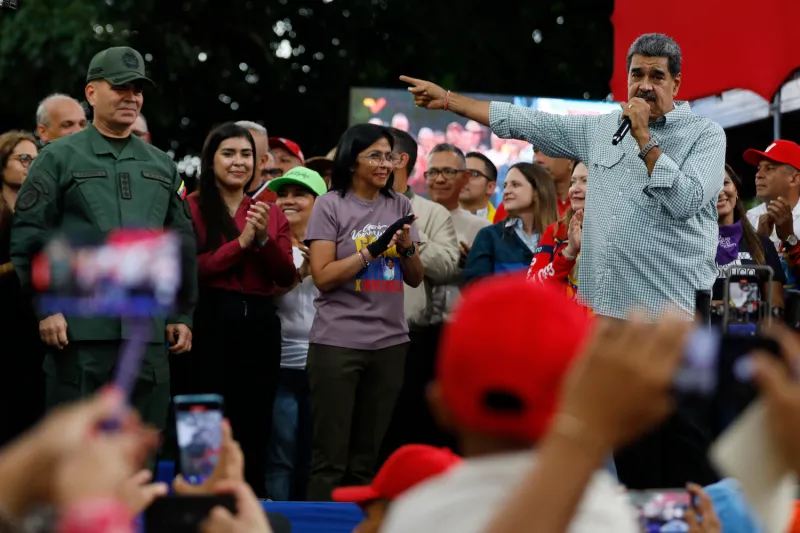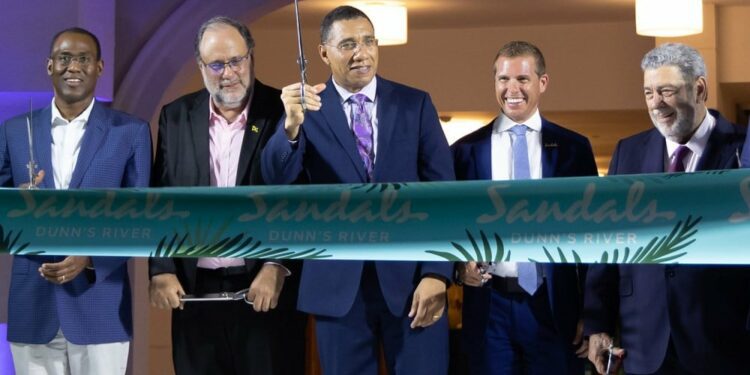Colombian migrants line up to board a deportation flight at Albrook Airport in Panama City on Aug. 20.Arnulfo Franco/AFP via Getty Images
Deportation flights. Last week, Panama carried out its first U.S.-funded deportation flight for northbound migrants who had entered Panama through its jungle border with Colombia, the Darién Gap. Many of those deported had criminal records in their home country of Colombia, a Panamanian security official told reporters. Panamanian President José Raúl Mulino said more flights in the coming days will deport people from China, Colombia, Ecuador, and India.
Migrants traveling northward through the region often start as far south as Brazil. Brazilian authorities have detected a flow of migrants who lack visas to visit Brazil entering São Paulo’s main international airport on stopover flights and then seeking refuge before beginning a northward journey on foot, according to an official investigation obtained by The Associated Press. Many of those people are from India, Nepal, or Vietnam, The AP reported.
Last week, Brazil’s justice ministry said it would restrict entry to some migrants who lack visas to Brazil, requiring them to continue with their layovers or fly home.
El Salvador-China relations. El Salvador’s legislature this month approved the country’s accession to the China-backed Asian Infrastructure Investment Bank (AIIB). Several other countries in the region—such as Brazil, Chile, and Peru—have also taken the step over the past half-decade. The move comes as El Salvador continues to deepen ties with Beijing. In 2018, the country switched its diplomatic relations from Taiwan to China.
While U.S.-China competition has created diplomatic tensions in Latin America, development banks remain an area where countries can often put geopolitics on the back burner and focus on business. The AIIB, for example, has had a green finance partnership with the Development Bank of Latin America and the Caribbean since 2022.
Mujica’s musings. Former Uruguayan President José Mujica, 89, has begun radiation treatment for a tumor in his esophagus. Since he announced his diagnosis in April, many journalists have traipsed to visit him in his three-room home on the outskirts of Uruguay’s capital, Montevideo.
Mujica is a beloved elder statesman known for his philosophical musings on life, and when the New York Times spoke to him this month, it was no different. Mujica’s doctor said the initial treatment went well. But the former Uruguayan president had a different take. “I’m broken,” he said. “There is only one life and it ends. You have to give meaning to it.”
Mujica has long espoused the importance of building personal relationships in today’s distracted world, saying that he threw his cell phone away four years ago. Direct communication is “nontransferable,” he said.
Before they became politicians, Mujica and his wife met fighting in a guerrilla group. What was it called?
Tupamaros
Sendero
M-19
National Liberation Action
Mujica has said his wife was part of a team that helped him and other Tupamaros escape from prison during Uruguay’s 1973-85 dictatorship.

Venezuelan President Nicolás Maduro delivers a speech next to Defense Minister Vladimir Padrino LĂłpez and Vice President Delcy RodrĂguez during a rally in Caracas on Aug. 28.
Venezuelan President Nicolás Maduro delivers a speech next to Defense Minister Vladimir Padrino LĂłpez and Vice President Delcy RodrĂguez during a rally in Caracas on Aug. 28.Pedro Rances Mattey/AFP via Getty Images
One month after Venezuela’s July 28 presidential election, President Nicolás Maduro has shaken up his cabinet as he continues a crackdown on dissent.
Vice President Delcy RodrĂguez will swap her additional post as finance minister for that of oil minister. Hard-line army Capt. Diosdado Cabello, who has held a range of public offices in the past, returned to the government as interior minister.
RodrĂguez’s move demonstrates that Maduro is trying to preserve relationships with the country’s business sector, Venezuelan journalist Eugenio G. MartĂnez posted on X; Cabello’s post signals a “radicalization of repression against dissidents” and an effort to shore up military support for Maduro.
That repression campaign includes a new law allowing the government to ban nongovernmental organizations if they promote “hatred,” sporadic shutdowns of social media platforms such as X, and hundreds of arrests. Last week, rights group Foro Penal calculated that Venezuela had 1,674 political prisoners, the most in its 21st-century history and the highest count in all of Latin America.
Although Venezuela’s supreme court—stacked with Maduro appointees—ratified his evidence-free claim that he won the election, many governments within and beyond Latin America say they will not do so without seeing disaggregated polling data.
In the meantime, countries including the United States continue to probe a narrow possibility that Maduro could negotiate some kind of exit from power.
“Many [Venezuelan] elites are weary of the prospect of Maduro assuming another illegitimate term,” the Atlantic Council’s Geoff Ramsey and Jason Marczak wrote this week in Foreign Policy. “The White House has an opening to liaise with such figures, making sure that ruling party elites and the military understand the potential benefits of a democratic transition.”
Source link : http://www.bing.com/news/apiclick.aspx?ref=FexRss&aid=&tid=66df925f38e24383b754210cb074c745&url=https%3A%2F%2Fforeignpolicy.com%2F2024%2F08%2F30%2Fjamaica-imf-economy-clarke-georgieva-donald-harris%2F&c=16602430428586388606&mkt=en-us
Author :
Publish date : 2024-08-29 21:00:00
Copyright for syndicated content belongs to the linked Source.










